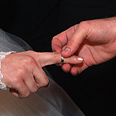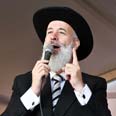
Histoic agreement
Photo: Israel Bardugo

Rabbi Yona Metzger
Photo: Noam Moskovich

Rabbi David Stav
Photo: Gabi Menashe
The Chief Rabbinate has released a new set of criteria for rabbis who can officiate weddings, indicating a breakthrough in the negotiations with the Tzohar
movement, whose officials have long claimed that they are being discriminated against by Israel's
top religious authority.
The new regulations make allowances for Religious-Zionist rabbis who have so far been denied the right to perform marriage ceremonies.
Opinion
Benny Doron
Knesset's love for private bills may once again intrude upon free elections for chief rabbi. Benny Doron on why suitability aside, tailor-made laws is not the way to go
The initiative was fronted by Chief Rabbi Yona Metzger, who led the talks with Tzohar.
Among those affected by the new policy are community rabbis who have not been assigned by a national religious council. Any such candidate who seeks to become a wedding officiant would have to pass a test on traditional Jewish marriage rites, provide proof that he has headed a congregation of at least 30 families for longer than two years and attend at least 10 weddings as an intern.
The directors of yeshivas and religious army prep schools, who have so far only been allowed to officiate at their students' weddings, will also be authorized to cater to the larger public; such candidates would have to produce recommendation letters from established rabbis and documentation confirming that their schools are recognized by the State, among other requirements.
'Historic agreement'
Yet another achievement for the Tzohar movement is the Chief Rabbinate's agreement to accept two senior officials from the movement to the council that probes the couples who wish to get married.
Tozhar, an organization representing the modern Orthodoxy, has accused the Chief Rabbinate of favoring ultra-Orthodox rabbis by giving them a free hand when it comes to marriage ceremonies. The new regulations address the complaint by requiring ultra-Orthodox officials to present documentation that proves they are eligible to preside over weddings. The old policy stipulated that any ultra-Orthodox rabbi recognized by his followers can marry couples.
"I'm glad that the members of the Chief Rabbinate have backed the initiative we have lead," Metzger said. "The goal was to extend the love, friendship and unity, and to prevent… any breaches in the fortress of religion that could have occurred had the conflict with Tzohar continued."
Despite the fact that the arrangement did not yield to all of Tzohar's demands, the Religious-Zionist movement welcomed the new policy.
"The agreement between Tzohar and the rabbinate marks a new start in the ties with Religious Zionism," said Tzohar Chairman Rabbi David Stav. "This is a historic agreement that clearly declares that Religious-Zionist rabbis are not in the slightest inferior to other sectors."
The deal did not touch upon the primary bone of contention between the rabbinate and Tzohar – the latter's demand to allow couples to register for marriage in any part of the country.















